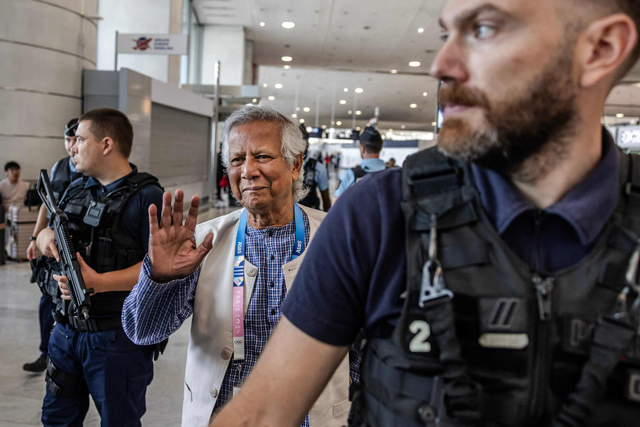You are here
Bangladesh mob, vowing to ‘guard revolution’, beats ex-PM’s supporters
By AFP - Aug 15,2024 - Last updated at Aug 15,2024

Protesters surround a suspected sympathiser of ousted ex-premier Sheikh Hasina, near the house of her father Sheikh Mujibur Rahman, the first president of independent Bangladesh, in Dhaka on Thursday (AFP photo)
DHAKA — Mobs vowing to guard Bangladesh's student-led revolution roamed the site of a planned rally for ousted premier Sheikh Hasina on Thursday, beating up some of her suspected supporters with bamboo rods and pipes.
Hasina, 76, fled to neighbouring India by helicopter last week as student-led protests flooded Dhaka's streets in a dramatic end to her iron-fisted rule of 15 years.
The interim government replacing her, led by Nobel laureate Muhammad Yunus, has invited UN investigators to probe the violent "atrocities" that accompanied her ouster, which saw hundreds killed by security forces.
Thursday is the anniversary of the 1975 assassination during a military coup of Hasina's father, independence hero Sheikh Mujibur Rahman, a date her government had declared a national holiday.
Huge rallies around Bangladesh marked the occasion in previous years but those glad to see Hasina toppled were eager to ensure supporters of her Awami League Party did not have a chance to regroup.
"Fugitive and dictator Sheikh Hasina has ordered her goons and militia forces to come to the site so they can produce a counter-revolution," Imraul Hasan Kayes, 26, told AFP.
"We are here to guard our revolution so that it doesn't slip out of our hands."
With no police in sight, hundreds of men — most of them not students — formed a human barricade across the street leading to Hasina's old family home, where her father and many of her relatives were gunned down 49 years ago.
The landmark was a museum to her father until it was torched and vandalised by a mob hours after Hasina's fall.
Several people that the crowd suspected of being Awami League supporters were thrashed with sticks, while others were forcibly escorted away.
Hasina, in her first public statement since her abrupt departure, asked supporters this week to "pray for the salvation of all souls by offering floral garlands and praying" outside the landmark.
Cult of personality
She was accused while in office of establishing a cult of personality around her father, who appears on every banknote.
Hasina changed the constitution to require a portrait of him appeared in every school, government office and diplomatic mission.
"Her government even made it an offence to criticise him online, punishable with up to 10 years in prison," Tom Kean of the International Crisis Group told AFP.
"While many people still have great respect for Sheikh Mujibur Rahman and his achievements... this had curtailed any real debate over his legacy."
Thousands of civil servants were required during her tenure to join public demonstrations on the anniversary of her father's death.
Awami League organisers would also set up temporary public address systems around Dhaka to blare out Mujib's old speeches as well as devotional songs praising his leadership.
The interim government cancelled observance of the politically charged holiday on Tuesday, requiring bureaucrats to remain in their offices.
And the prevailing sounds in the city of 20 million people on Thursday were the horns and engine hums of its perennially gridlocked traffic.
Arrests
Hasina's statement on Tuesday came hours after a court in Dhaka opened a murder case against her, two senior Awami League allies and four police officers related to the unrest.
Several other top politicians from the party have been detained in unrelated probes, including former law minister Anisul Huq and business adviser Salman Rahman.
Both men were in court on Wednesday under heavy police guard, handcuffed and wearing helmets for their protection.
Zunaid Ahmed Palak, formerly the telecoms minister and responsible for a nationwide internet blackout aimed at quelling anti-Hasina protests, was expected to be produced in court later Thursday according to local media reports.
'Atrocities'
Yunus, 84, returned from Europe last Thursday to head a temporary administration that faces the monumental challenge of steering democratic reforms.
He won the Nobel Peace Prize in 2006 for his pioneering work in microfinance, credited with helping millions of Bangladeshis out of grinding poverty.
He took office as "chief adviser" to a caretaker administration — all fellow civilians bar a retired brigadier general — and has said he wants to hold elections "within a few months".
Hasina's government was accused of widespread human rights abuses, including the mass detention and extrajudicial killing of thousands of her political opponents.
The interim Cabinet said that UN investigators would arrive next week to probe "atrocities" committed during the protests that ousted her.
A spokesperson for Volker Turk confirmed the fact-finding team and said the UN rights chief was "very committed" to supporting the interim government's "successful transition".
Related Articles
DHAKA — Ousted Bangladeshi premier Sheikh Hasina on Tuesday asked supporters to make a public show of strength later this week, hours after
DHAKA — Bangladesh's Nobel-winning microfinance pioneer Muhammad Yunus will lead an interim government after mass protests forced longtime p
DHAKA — At least a dozen people died in detention in Bangladesh since last year's revolution, including by torture and gunshot wounds, a rig













